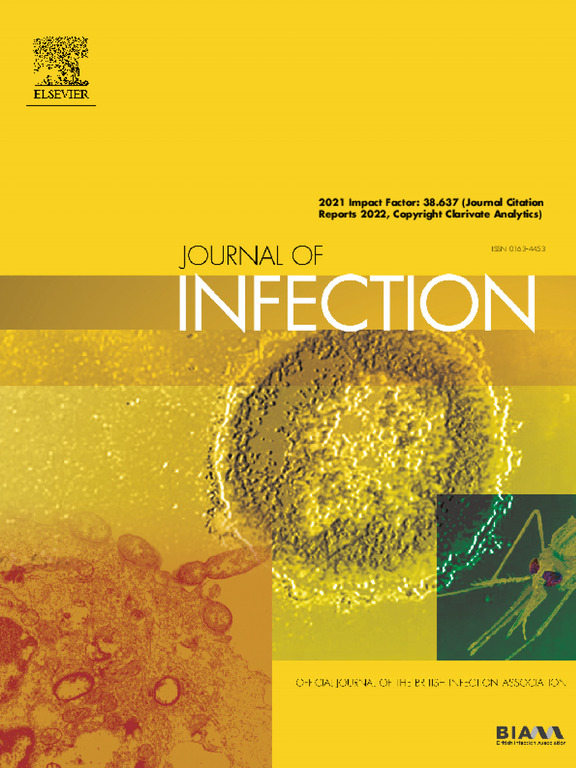霰弹枪宏基因组学用于感染诊断:一项前瞻性研究。
IF 11.9
1区 医学
Q1 INFECTIOUS DISEASES
引用次数: 0
摘要
背景:霰弹枪宏基因组学(SMg)有望显著改善传染病的微生物学诊断。然而,其在不同感染综合征的临床应用的前瞻性评价仍然缺乏文献记录。方法:我们进行了一项前瞻性研究,包括2018年2月至2020年1月期间在法国亨利蒙多医院国家参考实验室接受SMg治疗的所有患者。根据患者的临床表现,将其分为“高可能性”或“低可能性”感染。由传染病专家组成的多学科小组评估了SMg对最终诊断的贡献。结果:202例患者入组研究。在123例被认为有高感染可能性的患者中,有38例(30.9%)被SMg确诊为感染原因,其中12例(9.8%)是完全通过这种方法诊断的。在79名被归类为“低可能性”感染的患者中,SMg未检测到任何与感染原因相容的微生物。特别是后一组接受免疫抑制治疗的患者在6个月后没有出现恶化。解释:无论样本类型或感染部位如何,SMg有助于超过30%的复杂病例的微生物学诊断。与传统技术相比,SMg提供的诊断病例多10%,突出了其在不同传染病中的广泛应用。我们的研究结果表明,SMg是一种很有前途的工具,可以与传统的微生物学工具一起记录复杂的传染病。此外,阴性SMg结果对低感染可能性患者的管理是有用的。资助:本研究作为患者护理的一部分进行。本文章由计算机程序翻译,如有差异,请以英文原文为准。
Shotgun metagenomics for the diagnosis of infections: A prospective study
Background
Shotgun metagenomics (SMg) promises to significantly improve the microbiological diagnosis of infectious diseases. However, the prospective evaluation of its clinical utility in different infectious syndromes remains poorly documented.
Methods
We conducted a prospective study including all patients who underwent SMg as part of their care at the French Henri Mondor Hospital National Reference Laboratory for accredited SMg between February 2018 and January 2020. Patients were categorized as having either a "high likelihood" or "low likelihood" of infection based on their clinical presentation. The contribution of the SMg to the final diagnosis was assessed by a multidisciplinary team of infectious disease specialists.
Findings
202 patients were enrolled in the study. Of the 123 patients considered to have a high likelihood of infection, SMg confirmed the cause of infection in 38 cases (30.9%), including 12 cases (9.8%) diagnosed exclusively by this method. In the 79 patients classified as having a "low likelihood" of infection, SMg did not detect any microorganisms compatible with an infectious cause. In particular, patients undergoing immunosuppressive treatment within the latter group showed no deterioration after 6 months.
Interpretation
SMg facilitated microbiological diagnosis in over 30% of complex cases, regardless of sample type or site of infection. Compared with conventional techniques, SMg provided diagnoses in 10% more cases, highlighting its broad utility across different infectious diseases. Our results suggest that SMg is a promising tool for documenting complex infectious diseases alongside traditional microbiology tools. Furthermore, negative SMg results are useful for the management of patients with a low likelihood of infection.
求助全文
通过发布文献求助,成功后即可免费获取论文全文。
去求助
来源期刊

Journal of Infection
医学-传染病学
CiteScore
45.90
自引率
3.20%
发文量
475
审稿时长
16 days
期刊介绍:
The Journal of Infection publishes original papers on all aspects of infection - clinical, microbiological and epidemiological. The Journal seeks to bring together knowledge from all specialties involved in infection research and clinical practice, and present the best work in the ever-changing field of infection.
Each issue brings you Editorials that describe current or controversial topics of interest, high quality Reviews to keep you in touch with the latest developments in specific fields of interest, an Epidemiology section reporting studies in the hospital and the general community, and a lively correspondence section.
 求助内容:
求助内容: 应助结果提醒方式:
应助结果提醒方式:


